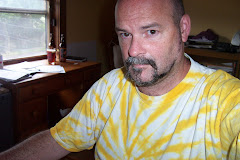Reading through Roethke’s Words for the Wind again, I am struck by the poet’s longing for, the urgent desire for, physical change, his wanting to awake into a new, pure form. From "The Snake":
I long to be that thing, / the pure, sensuous form
How now Proteus? Time and again, we’re given images of a kind of slop soup: weeds, compost, muck, roots, seeds – the breaking down of plant material on its way to its next form.
Weed Puller
Under the concrete benches,
Hacking at black hairy roots,--
Those lewd monkey-tails hanging from drainholes,--
Digging into the soft rubble underneath,
Webs and weeds,
Grubs and snails and sharp sticks,
Or yanking tough fern-shapes,
Coiled green and thick, like dripping smilax,
Tugging all day at perverse life:
The indignity of it!--
With everything blooming above me,
Lilies, pale-pink cyclamen, roses,
Whose fields lovely and inviolate,--
Me down in that fetor of weeds,
Crawling on all fours,
Alive, in a slippery grave.
Why such a emphasis on changing shape, and shapes changing, being born into a new body so to speak? I read Roethke and line after line is filled with sensuous descriptions of the body embracing nature, literally soaking in it at times. It all sounds so pleasurable, and yet the speaker wants out. I have a hard time reconciling a speaker who delights so physically in nature against his skin, with the urge to leave the body behind.
Take these lines for example. With Roethke, the rather tame Eros of Wordsworth’s poems, pressing his check against a mossy stone in Nutting, becomes much more charged. Here's a grab:
Running through high grasses,
My thighs brushing against flower-crowns;
Leaning, out of all breath,
Bracing my back against a sapling,
Making it quiver with my body.
I am always a bit reluctant to buy into backward looking poems (memories I mean) that ascribe a kind of sexual undercurrent to experience like this. But what the hell, it’s Monday. I can believe anything today. Still, Roethke hates his “epidermal dress” after all.
Epidermal Macabre
Indelicate is he who loathes
The aspect of his fleshy clothes,--
The flying fabric stitched on bone,
The vesture of the skeleton,
The garment neither fur nor hair,
The cloak of evil and despair,
The veil long violated by
Caresses of the hand and eye.
Yet such is my unseemliness:
I hate my epidermal dress,
The savage blood's obscenity,
The rags of my anatomy,
And willingly would I dispense
With false accouterments of sense,
To sleep immodestly, a most
Incarnadine and carnal ghost.
Again, in The Far Field poems (by far my favorite), the urge to transcend the body; poems and passages are full of “becomings” and “beginnings” and journeys out of the self.
“I, who came back from the depths laughing too loudly, / Become another thing;”
or:
“Believing: / I’ll returns again, / as a snake or raucous bird.”
Roethke remains for me and always will be a very influential poet. The poems of The Far Field especially, with their cataloging of flora and fauna, give me something of map for writing about the sexy fields I ran through.
Subscribe to:
Post Comments (Atom)
Search Poor Fool



No comments:
Post a Comment